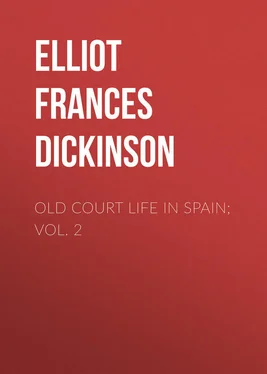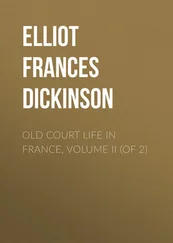Frances Elliot - Old Court Life in Spain; vol. 2
Здесь есть возможность читать онлайн «Frances Elliot - Old Court Life in Spain; vol. 2» — ознакомительный отрывок электронной книги совершенно бесплатно, а после прочтения отрывка купить полную версию. В некоторых случаях можно слушать аудио, скачать через торрент в формате fb2 и присутствует краткое содержание. Жанр: foreign_antique, foreign_prose, на английском языке. Описание произведения, (предисловие) а так же отзывы посетителей доступны на портале библиотеки ЛибКат.
- Название:Old Court Life in Spain; vol. 2
- Автор:
- Жанр:
- Год:неизвестен
- ISBN:нет данных
- Рейтинг книги:3 / 5. Голосов: 1
-
Избранное:Добавить в избранное
- Отзывы:
-
Ваша оценка:
- 60
- 1
- 2
- 3
- 4
- 5
Old Court Life in Spain; vol. 2: краткое содержание, описание и аннотация
Предлагаем к чтению аннотацию, описание, краткое содержание или предисловие (зависит от того, что написал сам автор книги «Old Court Life in Spain; vol. 2»). Если вы не нашли необходимую информацию о книге — напишите в комментариях, мы постараемся отыскать её.
Old Court Life in Spain; vol. 2 — читать онлайн ознакомительный отрывок
Ниже представлен текст книги, разбитый по страницам. Система сохранения места последней прочитанной страницы, позволяет с удобством читать онлайн бесплатно книгу «Old Court Life in Spain; vol. 2», без необходимости каждый раз заново искать на чём Вы остановились. Поставьте закладку, и сможете в любой момент перейти на страницу, на которой закончили чтение.
Интервал:
Закладка:
Poor young Grand Master! How was he to know if that young heart fluttered alone for him, or if those pulses beat to the music of another voice?
A thousand good resolutions were formed when Blanche was absent. But they were all scattered to the winds when her soft eyes rested on his, with that appealing look that was so touching. After all, he meant no harm, only he must know whether she loved him or not. Life was intolerable without; and as the putting of this question grew more and more difficult as time wore on, he left Narbonne without asking it.
Now Blanche is at Valladolid, in the Gothic palace, with its dark patio and big angular casements, which still jut out over the street just as they did then.
She is expecting the king, who is to arrive that very night. Need I say that she is quite beside herself with terror? Resistance is vain; as well might the helpless lamb resist the butcher’s knife.
The dreadful hour has come when she is to be eaten up by the royal ogre, and she can only lie and sob in the quaint painted chamber prepared for her. Claire de Coucy, quite unconscious of what is really breaking Blanche’s little heart (for she has kept her own counsel in all but hatred of Don Pedro), is busying herself about her, with many entreaties not to make herself look a fright. Even if she does hate the king, is there not Don Fadique, and all those other splendid Sevillianos, specially Don Juan de Mañara, whose fame has reached Narbonne, as the boldest lover in Spain?
“Surely it is not so hard to be a queen, and live in sunny Seville, in the beautiful Alcazar!” says Claire, turning over the marriage ring all the time, an uncut emerald of priceless value, which Blanche has flung on the floor and, unlike her gentle self, stamped on.
There lie the marriage gifts. The jewelled diadem and sceptre, as Queen of Castile; the Oriental combs and bracelets, cut in antique silver, the collar of sapphire, the solid links of sequins, the rare Tunisian lace and Algerine embroideries, jewelled fans, and veils of rarest lace of such delicate texture, no one had ever seen the like before. All sent in perfumed chests of sandalwood, covered with royal crowns.
To Claire, who is just out of a convent, and has never seen a marriage or a bride, it does occur that Blanche is strangely still and sad; but she supposes it is the proper thing, and that Blanche knows best, so she goes on turning over the marriage gifts with little exclamations of delight, as each fresh object seems to her more lovely than the last.
But when, all in a moment, as Claire is winding round her waist a light Moorish scarf, worked in a perfect kaleidoscope of silken thread and pearls, Blanche (unable any longer to keep silent) staggers up and falls upon her neck, sobbing as if her heart would break, it is the most astonishing event her small experience has ever conceived.
Much more, when Blanche, putting her rosy lips to Claire’s shell-like ear, whispers in a voice choked with tears: “I love him, I love him! I cannot go to Don Pedro. I know he will kill me. I hate him. I won’t go! Be kind to me, Claire, and help me, for I love him!” – her astonishment turns into terror, for she thinks Blanche is gone quite mad.
“Love whom?” she gasps, feeling cold all over, and letting the scarf drop to support the quivering form of Blanche.
“Who? Why, Don Fadique to be sure,” she answers, blushing all over. “Why – you must be blind, Claire, not to see it – at Narbonne. Who else could it be?”
And Blanche’s fair head, covered with small child-like curls, drops upon Claire’s friendly neck and buries itself there, as she clings to her tighter and tighter.
“Oh, Blanche!” was all Claire could say, being too utterly staggered to remonstrate. “Don Fadique! Why, he is your husband’s brother? Oh, Blanche, do you mean what you say?”
“Yes, I do,” falters out Blanche, in an almost inaudible voice “I love him, oh, I love him!”
The very uttering of these words gave her courage. The secret had passed her lips. The spell of silence was broken.
“Don Fadique!” exclaims Claire. “Why, he must be the greatest traitor in the world.”
“He does not know it!” returns Blanche, reddening to the roots of her hair. “He does not guess it. He is an angel.” As she speaks, a quick, warm light comes into her eyes, a soft flame rises on her cheeks, kindling up her whole face with an inexpressible glow. Even her slender figure seems to gather strength and height. “No! no! you must say nothing against him! He is perfect.”
Claire, who was very pious, and just out of a convent, where the nuns had taught her all men were dangerous and to be avoided, actually recoiled. That a wife should love her lord and receive presents from him and letters was admissible, even among the nuns – but another man!
Her pretty hands dropped from Blanche’s waist, and for some moments she could not speak.
“What!” she exclaims at last. “Holy Mary, what a horror!” at which the poor little queen takes courage to reply:
“A husband, Claire, why you seem to forget I have never seen him. How can I love a man I do not know? I have seen Don Fadique. That makes a great difference. If Don Pedro is what they say, and strangles women, I do not see how I can ever love him. So I told my father. I did say that , Claire. I suffered very much. You know it, you cruel girl. I was brought here against my will. I shall die when I see the king, I shall die,” she repeats shuddering. “Besides, why did he send Don Fadique to marry me in his name? If I had never seen him, I could not love him.”
A sweet pout came over her childish face as she gazed into Claire’s eyes, confident that these arguments must convince her.
But Claire only shook her head, and continued to stand aloof. The teaching of the nuns still held her. Was it not better that Blanche should die and be buried, sooner than not love her husband? Yet the gentle little queen had used a mighty weapon in talking of her death. Death was so awful, so far away from the fresh rosy life of Claire, that with the charming inconsistency of youth, Claire, impetuous and ardent in all things, in a moment forgetting all about the nuns, flung her arms round Blanche’s neck.
“Dear, dear princess,” was all she could utter, “don’t talk of death. I know it is very wrong, but I love you too well to chide you. Promise me that you will not speak to Don Fadique any more. Say an Ave when he comes near you, and make the sign of the Cross when you feel his eyes. Remember, whether you like it or not, you are Don Pedro’s wife. No! no! don’t push me away. It is true. Great princesses and queens must learn to command themselves more than other folk. My father said so, before I left Navarre, and that I was not to follow what you did, because you were of royal blood.”
Then Blanche and Claire, fully reconciled, sat down side by side to talk under the shadow of the Gothic casement, which lit up the room; the freckled colour of the painted glass falling upon them in patches of glowing light, as the trees outside swayed to and fro; Claire going on about her duty to her husband and to her new country. She was quite eloquent, and repeated all the fine things which had been taught her out of history. Not only Aves and crossings, but fasting and penance were suggested by the ingenious Claire, as helps against temptation, until poor Blanche, quite stupefied, took up a lute which lay upon the seat and hummed a French love song; and Claire, remembering there was a string of pearls loose in the wedding robe in which Blanche was to appear before the king, kissed her and went out.
CHAPTER IV
Don Fadique’s Declaration of Love
WHILE Blanche sat all alone, the arras gently lifted and Don Fadique stood before her. Not gay and triumphant as she had seen him at Narbonne, but pale and grave and habited in a grey justaucorps with a simple hood – more in the guise of a penitent than a gay young knight.
Читать дальшеИнтервал:
Закладка:
Похожие книги на «Old Court Life in Spain; vol. 2»
Представляем Вашему вниманию похожие книги на «Old Court Life in Spain; vol. 2» списком для выбора. Мы отобрали схожую по названию и смыслу литературу в надежде предоставить читателям больше вариантов отыскать новые, интересные, ещё непрочитанные произведения.
Обсуждение, отзывы о книге «Old Court Life in Spain; vol. 2» и просто собственные мнения читателей. Оставьте ваши комментарии, напишите, что Вы думаете о произведении, его смысле или главных героях. Укажите что конкретно понравилось, а что нет, и почему Вы так считаете.












